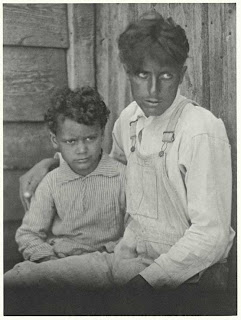A quick conversation starter... Several posts on your own blogs and comments to this blog's posts have brought up the issue of performance. We often rely on a distinction between "being" a certain way and "acting" a certain way...but I'm thinking that's a line that deserves some smudging.
Specifically: in comments about Trail Maids, etc., there's a running theme of what they're
thinking about as they dress up,
playing "dress up" in general, and whether or not they're knowingly hashing out issues of slavery. Now, the Trail Maids and the issue of "southern womanhood" is just one example...Surely this question of
consciously doing this or that can translate to all sorts of topics when discussing religion and the South.
SO, since that's the case, let me add the following (to the specific case of trail maids/femininity):
1. I would be pretty surprised if someone, as she puts on an antebellum dress, actively thinks while she picks up her parasol: "I am now choosing to be complicit in a social script steeped in the horrors of slavery."
2. I'm not sure if the fact of #1 matters though... Or does it? Tell me what you think.
3. Some theory for your reading/thinking pleasure (posted a shorter version of this in a comment to the trail maids, too):
In the chapter you read from McPherson's
Reconstructing Dixie, McPherson suggests:
"Central to constructions of southern femininity is a notion of masquerade or performance...In her 1929 essay 'Womanliness as a Masquerade,' [Joan] Riviere structures an equation between femininity/womanliness and masquerade, writing that 'the reader may ask how I define womanliness or where I draw the line between genuine womanliness and the masquerade...they are the same thing'. In [Mary Ann] Doane's analysis, such a formulation of femininity renders it 'in actuality non-existent' because 'it makes femininity dependent upon masculinity for its very definition'. For Doane, femininity as masquerade is both normal and...pathological. Such an understanding of normal or aberrant femininity as always a masquerade, a performance, echoes my own claim that femininity is a social and discursive construction, and thus its contours are always sketched in relation to other markers of difference. But Doane's argument that this approach makes femininity always dependent on, derivative of, masculinity...enacts an erasure of the other social relations against which femininity takes shape and is performed (21-22).
McPherson wants to add to sexual difference the differences in race and region that also mark the masquerade, so she sees herself as adding to and expanding what Doane and Riviere do in psychoanalytic contexts. Nonetheless, the central point is still one of whether or not social actors must be CONSCIOUSLY engaged in something in order to be identified as engaging in it.
There's an interesting debate to be had here, as there's surely something to be said for personal identification (I am able to mark myself or identify as this or that no matter what scholars or peers might say to the contrary). At the same time, don't social frameworks and interests get stacked up or dismantled by our often unconscious behaviors?
Personally, I don't find a lot of use for talking about things like "intent" or the "unconscious." I'm not telepathic, and I don't know what swims in the gray matter of others. I do find a lot of use in talking about behavior and action, though. And whether these things are "conscious" or not, they seem to have material consequences in a discursive and material world.
So does it matter whether we know what we're doing if we're still doing it?
123go!








